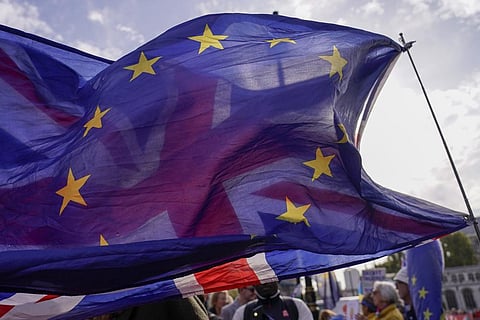The moron risk premium, Brexit and lessons
The ‘moron risk premium’ is a term for our times. The pithy phraseology, a contribution of British analyst Dario Perkins to punditry, eloquently characterises the economic costs of political blunders. Its usage, though, should not be limited to explaining the state of the bond market in the United Kingdom. It qualifies for residence in a world coping with rapid disruptions. The phrase ‘moron risk premium’ defines why Britain finds itself where it is and the price paid for Brexit.
Brexit worsened fragility and widened faultlines. The authors of Britannia Unchained in fact, constrained Britain. The headlines in Britain are about the leadership contest – between Rishi Sunak, who wields the ‘I told you so’ card, and the return of Boris Johnson, heralded by the hashtag #BorisForPM. The silence about the cause of economic turmoil is as deafening as the decibels about the consequences.
Availability and affordability of money could worsen as the US Federal Reserve, faced with high inflation, hikes rates further and the pound approaches parity with the dollar. On Friday, rating agency Moody’s changed the outlook on the UK from stable to negative, citing a host of reasons, including lower growth, political volatility, and policy unpredictability. The causation of the catastrophic circumstance in the UK is essentially the unravelling of Brexit.
The worst fears of 2016 are haunting the British economy. Earlier this year, the Office for Budget Responsibility observed that the new trading relationship between the UK and the EU "will reduce long-run productivity by 4 per cent relative to remaining in the EU" and that "both exports and imports will be around 15 per cent lower". Indeed, the OBR reveals that compared to other G7 economies, the UK "missed out on much of the recovery in global trade". Britain now trails India in size of the economy, lags in GDP growth among its G7 peers and indeed is forecast to grow in 2023 at barely 0.3 per cent by the IMF and 0.0 by the OECD.
Amid the debate about the blue walls and red walls of British party politics, the cost of walling the economy has received scant attention. The piety of intent in policy has limited utility. Arguably freedom from red tape and 'sovereignty of policies' was a selling point for Brexit, but in reality, the bureaucracy of one EU is now replaced by that of 27 countries. The flow of capital -- dependent on the sustainability of enterprises -- is now threatened by poor growth. Economic growth depends on factors of productivity -- principally affordability of capital and access to labour. Brexit, and the votaries of the Rwanda model, shut the inflow of skills and labour essential for growth.
The spectacle of uncertainty witnessed in Britain carries valuable lessons for the developed world on how it approaches the critical issue of labour mobility and migration. For over two decades, the attempts by India and other developing countries to clean up the quagmire of mobility and migration in the WTO have been thwarted by developed countries.
Free trade agreement negotiations run into a wall of resistance when it comes to mobility and migration. The spectacle of delays in issue of visa (see https://visalimbo.netlify.app/ for a snapshot) carries the scent of political impulse. It is true that the pandemic affected operations but the persistence of delays is inexplicable. Is this the best developed nations can do? Could the issue of visas be rendered into a new non-tariff barrier? Small wonder countries are flagging it at WTO.
The fact is that the developed world resides on the wrong side of demographic change -- the working-age populace in the developed world will shrink by nearly a billion, whereas the developing world will add over a billion. The dependency ratio, that is, the proportion of folks over 65 years dependent on those of working age, in G7 countries is rising -- it is 75 per cent in Japan, 67 per cent in Italy, 63 per cent in Germany, 55 per cent in France, 53 per cent in the UK and nearly 50 per cent in the United States.
Juxtapose this with the fact that the services sector accounts for over two-thirds of the GDP of these countries, and it translates into a need for human talent. Investment in technology could perhaps reduce human interface in some sectors but the shortfall will show up in basic governance -- whether it is health care, education, even essential security services.
The shortfall in the working-age population will impact governance and growth -- fewer income earners effectively means less consumption and lower growth. This will show up on the balance sheets of the economy, affect welfare allocations, and sustaining pensions and will daunt the sustainability of debt.
There was a time when rich monarchies colonised countries for resources. In the post-war era, countries colonised markets. The global economy has since evolved into a vastly complex matrix of interdependence. Recent events threaten global economic architecture and the developed world will need to do more than preach about the need to preserve rule-based world order. Sustaining the world order calls for equitable partnership in installing a vision of shared prosperity.

